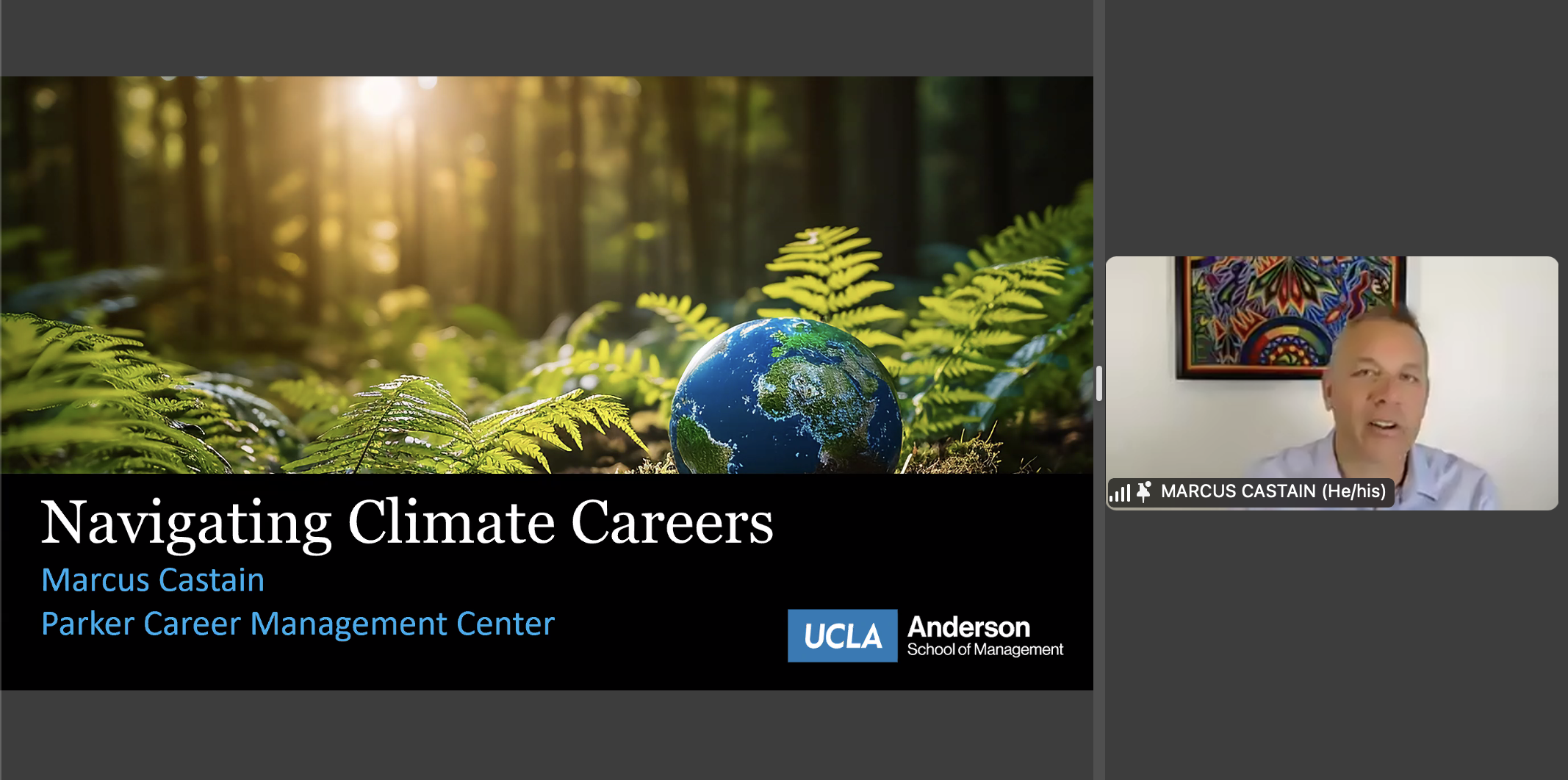Career Insights for MBAs from ClimateCATALYST 2025
Last month, ClimateCAP launched ClimateCATALYST, a high-impact summer program designed for incoming MBA students who want to lead at the intersection of climate strategy and business. Before classes at most schools began, MBAs dove into faculty lectures on topics like decarbonization strategies and energy fundamentals, and participated in panel discussions and case studies with professionals in the field. From the 550 students from 81 MBA programs registered, one theme was incredibly clear – MBAs are committed and eager to find ways to integrate climate into their careers.
Across the sessions, MBA alumni and career experts shared experience and advice with students.
Check out three key themes from those sessions.
1. There’s No One Path—But You Need a Clear Direction
Climate careers are highly diverse. Our experts came from a variety of backgrounds—from military service to consulting, nonprofits to investment banking, and more. Some pursued MBAs to pivot into climate; others found climate through their MBA experiences in investing, operations, and entrepreneurship. Despite their varied experience, many of the climate professionals touched on the importance of clarity in the career search.
As Marcus Castain, Associate Director at UCLA Anderson’s Parker Career Center, emphasized, MBAs need to get specific in their search. He advised students to think about four key career decisions:
Industry vertical (e.g., clean energy, circular economy, agtech)
Function (e.g., product management, investing, operations, business development)
Geography (e.g., where the action, and supportive climate-policy, is)
Org type (e.g., startup, nonprofit, government, VC, Fortune 500)
Get clarity on these dimensions as early as possible. Not only does this help you network more effectively, but it also signals to recruiters and alumni that you’re serious, focused, and worth mentoring.
2. Climate Employers Want Experts, Not Just Enthusiasts
Passion for sustainability is important, but in today’s market for climate roles, enthusiasm is just the entry point. You need to be fluent in the language and mechanics of your chosen field.
Panelists repeatedly emphasized the need to do your homework: read white papers, follow regulatory changes, subscribe to sector-focused newsletters and podcasts, and dive deep into your sector’s trends. Regardless of your area of interest, you’ll be expected to bring thoughtful and specific questions, not vague interests.
Castain cited how a candidate failed an interview at a water-focused organization by answering a technical question with general enthusiasm about “sustainability.” The hiring manager’s response? “We want people who care about water.”
Similarly, to break into climate tech or climate tech investing, Deanna Zhang, CEO of V1 Climate Solutions, recommended "have a perspective" to help you stand out. "Don't be afraid to just say what you think. If you're thoughtful about it, if it's well researched, you will be surprised at what doors that will open up for you."
3. Relationships Matter More Than Job Boards
Many MBAs default to what Castain calls “spray and pray,” which is blasting resumes into online portals and hoping something sticks. That approach rarely works in climate—or in business more broadly, for that matter—when hiring often happens through networks, referrals, and informed conversations.
While many climate sub-sectors are growing fast, the communities within them are often tight-knit. Employers in this space are looking for both credentials and people who have demonstrated strong interest in the sector, often dipping into trusted networks to find candidates who are mission-aligned and capable.
To maximize your recruiting time, focus on building genuine professional relationships. Reach out to alumni. Attend climate conferences and webinars. Join Slack communities. Ask for informational interviews—not to pitch yourself, but to learn. People are far more willing to help those who demonstrate commitment, curiosity, and preparation.
Even more important: start now. Your MBA years aren’t just preparation—they’re opportunity. Bring climate into classroom discussions. Take climate-focused electives. Choose climate-aligned internships or capstones. Launch a campus initiative. Apply for the ClimateCAP Fellowship. These experiences build your credibility—and expand your options.
Katie Kross, co-founder of ClimateCAP, put it simply: “You can influence climate through your career, but also through your classroom, your community, your conversations. Start where you are.”
Marcus Castain kicks off his presentation during ClimateCATALYST

